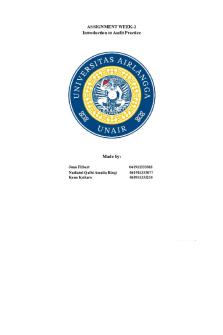Case Study Week 3 PDF

| Title | Case Study Week 3 |
|---|---|
| Author | lindsey Tucciarone |
| Course | Personality Psychology |
| Institution | Grand Canyon University |
| Pages | 3 |
| File Size | 57.5 KB |
| File Type | |
| Total Downloads | 95 |
| Total Views | 175 |
Summary
sdd...
Description
Lindsey Tucciarone February 12, 2020 PSY-352 Krista Bridgmon
Stress Case Study
Max is experiencing what most people in the world do daily. His risk factors are that he works a lot of hours as well as undesirable shifts and is not financially stable at the time and can only afford to live in his busy city that has become unsafe. Max’s resilience factors are that he has a ton of reliable friends and family that he can rely on as well as working out to reduce stress. Max is at risk for stress because of his daily life stressors and well as the every once in a while stress from events. The regular exercise would be more beneficial if Max did not eat unhealthy foods. He is also smokes to reduce stress which affects the way his brain, lungs and other major organ functions. He could possibly get cancer, high blood pressure, COPD or other illnesses pertaining to tobacco smoke and it’s carcinogens and toxins (Diehl, 2011). The heavy stress load of being unable to make important decisions at work, he is sole provider, his finances are dwindling and his vehicle is inoperable due to the fact that he could not afford to repair it. The human psychic is incredibly fragile when it comes to trigger and trauma’s. Research indicates that behavior can weaken immune system functions (Sarafino & Smith, 2017). Extreme stress may increase said bad habits. Professor Froma Walsh, has written notably on family resilience and the constructive adaptation of families (Diehl, 2011). A developmental systems
structure, the Professor considers the fundamental developments in family resilience and gives a great overview of the concept from a family systems perspective (Sarafino & Smith, 2017).
Strengths such as appreciation, kindheartedness, faith, and valor have been implied to act as defensive factors against life’s misfortunes, assisting us to adapt clearly and cope with struggles such as physical and mental illness’.
Reference
Diehl, Manfred (2011) US National Library of Medicine National Institutes of Health. Risk and Resilience Factors in Coping with Daily Stress. Retrieved from https://www.ncbi.nlm.nih.gov/pmc/articles/PMC2936708/
Sarafino, E. & Smith, T. (2017). Health Psychology: Biopsychosocial Interactions (9th ed.). Hoboken, NJ: Wiley. ISBN-13:9781119299486...
Similar Free PDFs

Case Study Week 3
- 3 Pages

Endocrine Case Study Week 3
- 8 Pages

Case Study Week 3 Nitin Sharma
- 8 Pages

Week 3 Case Study - year 2020
- 4 Pages

Overdose Case Study Week 3 SPR21
- 3 Pages

Week 8 case study
- 6 Pages

Week 5 case study
- 13 Pages

Case 3 - Case study 3
- 2 Pages

Week 11 case study
- 5 Pages

Case 3 - L\'Oreal - Case Study
- 1 Pages

Week 5 Alibaba - Case Study
- 1 Pages

Case 3 Questions - case study
- 1 Pages

Leighty Week 2 Case Study
- 7 Pages

SLopez Week 15 Case Study
- 2 Pages
Popular Institutions
- Tinajero National High School - Annex
- Politeknik Caltex Riau
- Yokohama City University
- SGT University
- University of Al-Qadisiyah
- Divine Word College of Vigan
- Techniek College Rotterdam
- Universidade de Santiago
- Universiti Teknologi MARA Cawangan Johor Kampus Pasir Gudang
- Poltekkes Kemenkes Yogyakarta
- Baguio City National High School
- Colegio san marcos
- preparatoria uno
- Centro de Bachillerato Tecnológico Industrial y de Servicios No. 107
- Dalian Maritime University
- Quang Trung Secondary School
- Colegio Tecnológico en Informática
- Corporación Regional de Educación Superior
- Grupo CEDVA
- Dar Al Uloom University
- Centro de Estudios Preuniversitarios de la Universidad Nacional de Ingeniería
- 上智大学
- Aakash International School, Nuna Majara
- San Felipe Neri Catholic School
- Kang Chiao International School - New Taipei City
- Misamis Occidental National High School
- Institución Educativa Escuela Normal Juan Ladrilleros
- Kolehiyo ng Pantukan
- Batanes State College
- Instituto Continental
- Sekolah Menengah Kejuruan Kesehatan Kaltara (Tarakan)
- Colegio de La Inmaculada Concepcion - Cebu

